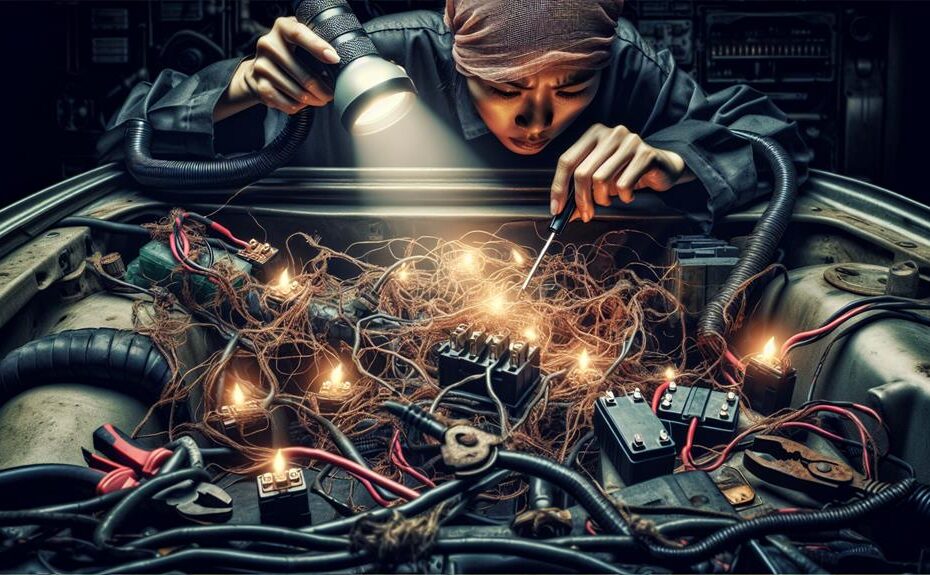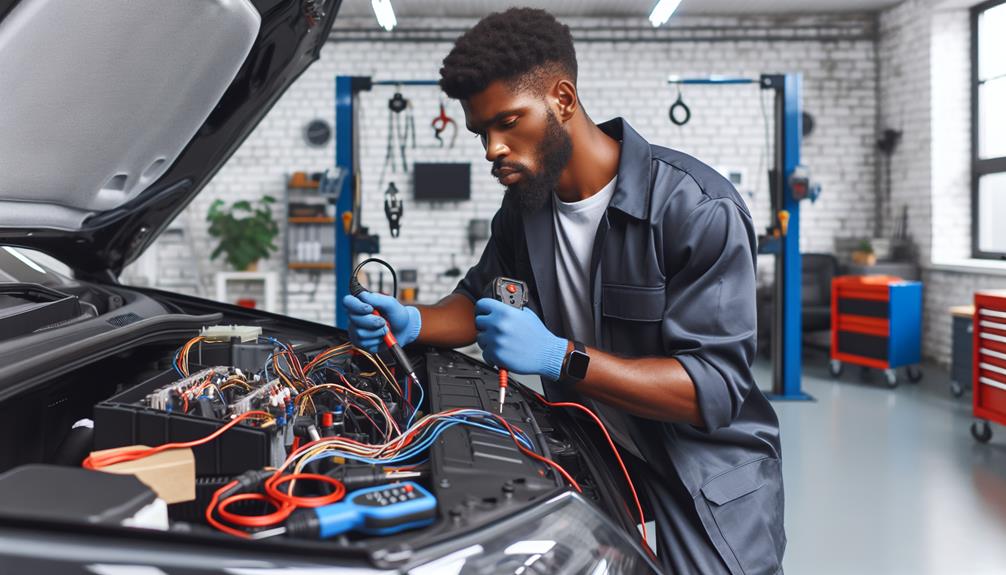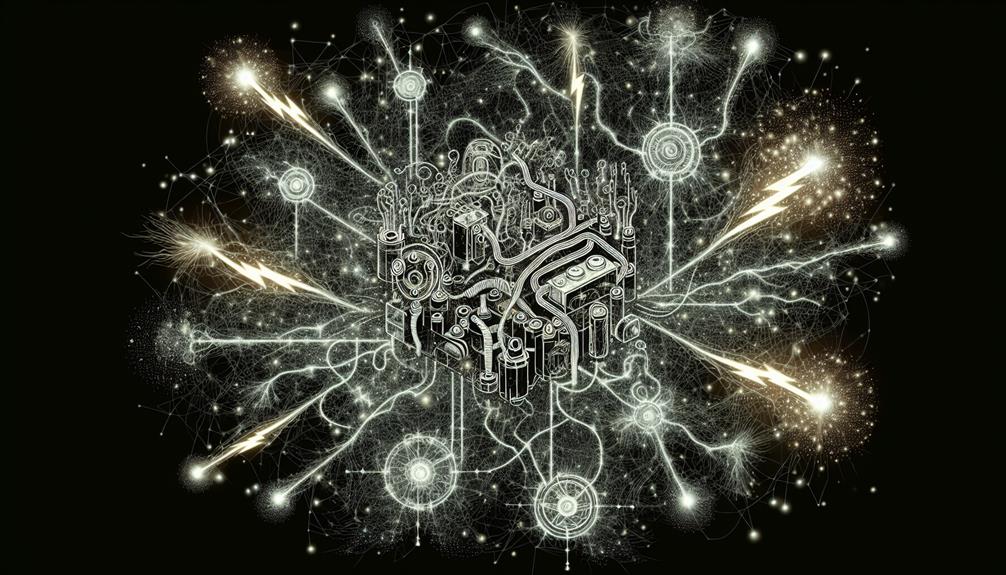Oh, you thought your car's electrical system was invincible, didn't you? Well, think again. It turns out that even the most reliable vehicles can succumb to the dreaded failure of their electrical systems.
But why, you ask? What could possibly cause such a catastrophic event? Well, dear reader, buckle up and prepare yourself for an enlightening journey into the mysterious world of car electrical failures.
Trust me, you won't want to miss what's about to unfold.
Key Takeaways
- Corrosion and loose connections can lead to electrical failures, so regular inspection and cleaning of connections is important.
- Battery issues, such as slow engine crank and dimming lights, can indicate a weak or faulty battery, so regular battery maintenance is essential.
- Faulty alternators can cause problems like dead batteries and difficulty starting the car, so prompt inspection and addressing of alternator failure is necessary.
- Wiring problems, such as overloading circuits and inadequate insulation, can lead to electrical system failures, so regular inspection and replacement of damaged or worn-out wiring is recommended.
Corrosion and Loose Connections
Corrosion and loose connections in a car's electrical system can lead to various failures and malfunctions. To prevent corrosion, it's essential to ensure that all electrical connections are properly sealed. Corrosion occurs when moisture and contaminants infiltrate the connections, causing oxidation and degradation of the metal surfaces. Regularly inspecting and cleaning the connections can help prevent this.
When troubleshooting loose connections, start by identifying the specific component or circuit affected. Inspect the connection points for signs of looseness, such as wiggling or intermittent operation. Tighten the connections securely, ensuring a snug fit without over-tightening. If the connections are damaged or corroded, clean or replace them as necessary.
In some cases, using dielectric grease on the connection points can provide added protection against moisture and corrosion. This grease creates a barrier that prevents moisture from reaching the metal surfaces, preserving the integrity of the connections. Additionally, using shrink tubing or electrical tape to cover the connections can offer further insulation and protection.
Battery Issues
Battery issues can cause various failures and malfunctions in a car's electrical system. Proper battery maintenance is crucial to ensure the smooth functioning of your vehicle's electrical components.
Here are some common symptoms that indicate potential battery issues:
- Slow Engine Crank: If your engine cranks slowly when starting, it may be a sign of a weak battery. This can be caused by a discharged or aging battery.
- Dimming Lights: When your headlights and interior lights become dimmer than usual, it can indicate a battery problem. This happens because the battery is unable to provide enough power to the electrical system.
- Frequent Jump-Starts: If you find yourself frequently needing to jump-start your car, it's likely that your battery is no longer holding a charge. This could be due to a faulty battery or a problem with the charging system.
- Electrical Component Failure: A failing battery can cause various electrical components, such as power windows and radio, to malfunction or stop working altogether.
To prevent battery issues, regular battery maintenance is essential. This includes inspecting the battery for signs of corrosion, ensuring that connections are tight and clean, and testing the battery's voltage regularly.
Faulty Alternator
A faulty alternator can lead to various electrical system failures in your car. The alternator is responsible for generating electrical power and charging the battery while the engine is running. When the alternator fails, it can cause a range of problems that affect the overall performance of your vehicle's electrical system.
One of the signs of alternator failure is dimming or flickering headlights. This occurs because the alternator isn't providing enough power to keep the lights at their normal brightness. Another common symptom is a dead battery or difficulty starting the car. Since the alternator charges the battery, a faulty alternator can lead to a drained battery and an inability to start the engine.
If you notice any of these signs, it's important to address the issue promptly. Ignoring alternator failure can lead to further damage to other electrical components in your car. Depending on the severity of the problem, alternator repair may involve either replacing the faulty alternator or repairing the existing one.
To avoid alternator failure, it's recommended to have your alternator regularly inspected as part of your car's maintenance routine. Identifying and addressing any potential issues early on can help prevent electrical system failures and costly repairs down the line.
Wiring Problems
Wiring problems can cause a multitude of electrical system failures in your car, impacting the overall performance and functionality of various components. Here are four common wiring problems that can lead to these failures:
- Overloaded circuits: When too much current flows through a circuit, it can overload the wiring and cause it to overheat. This can result in melted insulation, short circuits, and even fires. Overloaded circuits often occur when aftermarket accessories are added without considering the capacity of the existing wiring.
- Inadequate insulation: Wiring with inadequate insulation can lead to a variety of issues. Without proper insulation, wires can come into contact with each other or with metal parts of the car, causing short circuits and electrical malfunctions. In addition, inadequate insulation can make the wiring more susceptible to damage from moisture, heat, and vibrations.
- Poor connections: Loose or corroded connections can disrupt the flow of electricity and cause intermittent or complete electrical failures in your car. These problems can occur at various points in the wiring system, including battery terminals, fuse boxes, and connectors. Regular inspection and maintenance of connections can help prevent these issues.
- Damaged or worn-out wiring: Over time, wiring can become damaged or deteriorate due to exposure to the elements, heat, and vibrations. Cracked or frayed insulation, exposed wires, and corroded conductors can all lead to electrical system failures. It's important to regularly inspect the wiring in your car and replace any damaged or worn-out wiring to avoid potential problems.
Malfunctioning Electrical Components
One common cause of car electrical system failures is the malfunctioning of various electrical components. These components play a crucial role in the overall functioning of the car's electrical system, and when they become damaged or faulty, it can result in a range of issues.
Two key components that commonly experience malfunctions are damaged fuses and faulty ignition switches.
Fuses are designed to protect the electrical system by preventing excessive currents from damaging the circuits. However, if a fuse becomes damaged due to overload or a short circuit, it can cause a complete loss of power to certain electrical systems or even the entire vehicle. Regular inspection and replacement of damaged fuses can help prevent such failures.
The ignition switch is another critical component that can malfunction and lead to electrical system failures. The ignition switch is responsible for powering the electrical systems, such as the starter motor and the fuel pump, when the key is turned. If the ignition switch becomes faulty, it may fail to provide power to these systems, resulting in the car's inability to start or operate properly.
To prevent these malfunctions, it's essential to regularly inspect and maintain the electrical components in your car. If you notice any signs of damage or malfunction, such as blown fuses or difficulty starting the car, it's recommended to have the issue diagnosed and repaired by a qualified technician. By addressing these malfunctions promptly, you can ensure the reliable operation of your car's electrical system.
Frequently Asked Questions
How Often Should I Check for Corrosion and Loose Connections in My Car's Electrical System?
You should regularly check for corrosion and loose connections in your car's electrical system. By doing so, you can prevent potential failures and ensure proper functioning of the system.
What Are the Signs That Indicate a Faulty Alternator in a Car's Electrical System?
If your car's electrical system is failing, there are common causes and troubleshooting tips to consider. Signs of a faulty alternator include dimming lights, a dead battery, strange noises, and a burning smell.
How Can I Prevent Wiring Problems in My Car's Electrical System?
To prevent wiring problems in your car's electrical system, you should regularly maintain it. Common causes of wiring problems include corrosion, loose connections, and faulty components. Take steps like inspecting, cleaning, and securing the wiring to ensure proper functioning.
Are There Any Warning Signs That Indicate Malfunctioning Electrical Components in a Car?
If you notice flickering lights, a dead battery, or malfunctioning accessories, these are warning signs of electrical problems. Troubleshooting car electrical issues involves identifying faulty components and inspecting wiring for damage or loose connections.
Can a Weak Battery Cause Other Electrical Components in a Car to Malfunction?
Yes, a weak battery can cause other electrical components in your car to malfunction. Neglecting battery maintenance is one of the common causes of car electrical failures. It's important to regularly check and replace your battery when needed.
Conclusion
In conclusion, car electrical systems can fail due to a variety of reasons. Factors such as corrosion and loose connections, battery issues, faulty alternators, wiring problems, and malfunctioning electrical components can all contribute to system failures.
While these are common causes, it's also important to investigate the theory that environmental factors such as extreme temperatures or vibrations may play a role in electrical system failures, as this would add depth and complexity to our understanding of the issue.



